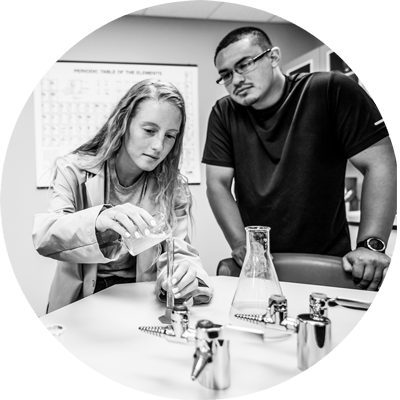
Forensic Science Program
Calumet College of St. Joseph’s Forensic Science program supports your passion for a career in criminal investigations and scientific research.
The Forensic Science degree prepares students with the biotechnology and forensic skills necessary to work in a federal, state, local or private criminal investigation laboratory, as well as graduate school opportunities.
Building upon a foundation of biology and chemistry, this program provides additional training in criminal investigation, forensic biology, human pathology, serology and forensic DNA analysis. Students are taught to collect and analyze biological evidence in both lab and field settings. They also learn how to handle biological evidence from mock crime scenes and present it in court.
Forensic Science graduates can also apply this degree to careers in research science, medical sales and scientific editing/journal writing, as well as technical careers in scientific laboratories, universities and research institutions.
In the Forensic Science Program, you will:
- Advance your scientific knowledge and critical thinking skills
- Hone your research skills and problem-solving ability
- Develop specific expertise in areas of sample preparation, data analysis, scientific calculations and more
- Sharpen your communication skills, verbally and in writing
Request Information
Program Highlights
$64,940 Median Salary
According to BLS.gov data, Forensic scientists earn a median salary of $64,940 per year, with hourly wages around $31.22.
13% Job Growth Increase by 2032
The need for skilled Medical Laboratory Scientists is expected to grow by 5% from 2022 to 2032, which is faster than the average for all occupations, based on BLS.gov data.
Comprehensive Forensic Skills and Graduate Preparation
At CCSJ, our Forensic Science program provides students with the forensic skills necessary to work in federal, state, local, or private criminal investigation laboratories. The program is also designed for those interested in pursuing graduate studies in forensic sciences, building on a solid foundation of biology and chemistry with specialized training in forensic DNA analysis.
Faculty
Ahmed Lakhani, Ph.D.
Daniel Stroik, Ph.D.
David Harnish, M.L.I.S.
Michael Keiderling, Ph.D.
Career
Options
Career Options with this major include but are not limited to:
- Forensic Scientist/Technician – $64,940
- Bioengineers and Biomedical Engineers – $100,730
- Law Enforcement Officer – $74,910
- Chemical Technicians – $56,750
- Crime Scene Investigator – $62,699

Frequently Asked Questions
A degree in Forensic Science opens various career opportunities, including:
- Forensic Scientist/Technician: Working in crime laboratories to analyze physical evidence, such as DNA, blood, hair, and fibers.
- Crime Scene Investigator: Collecting and analyzing evidence from crime scenes.
- Digital Forensic Analyst: Specializing in recovering and investigating data from digital devices.
- Law Enforcement Officer: Using forensic knowledge in the context of police work.
- Consulting and Teaching: Providing expertise in forensic science for legal cases or teaching at educational institutions.
The Forensic Science program at CCSJ is designed to prepare students for work in criminal investigation laboratories by offering:
- Hands-On Laboratory Training: Students gain practical experience analyzing physical evidence using the latest laboratory techniques and equipment.
- Mock Crime Scenes: Students participate in simulations of crime scenes to learn how to properly collect and preserve evidence.
- Internships: The program often includes internship opportunities where students work in forensic labs, gaining experience under the supervision of professionals in the field.
- Focus on Forensic DNA Analysis: The program builds on a strong foundation of biology and chemistry, with additional training in forensic DNA analysis, preparing students for specialized roles in forensic laboratories.
The Forensic Science program typically requires a combination of core and specialized courses, including:
- Core Science Courses: Biology, Chemistry, and Physics to build a strong scientific foundation.
- Forensic Science Core: Introduction to Forensic Science, Crime Scene Investigation, Forensic Biology, Forensic Chemistry, and Forensic Molecular Biology.
- Laboratory Techniques: Courses on laboratory methods, including DNA, chemistry, and trace evidence analysis.
- Criminal Justice Courses: Understanding the legal system, criminal law, and the role of forensic science in criminal investigations.
To succeed in forensic science, students should develop the following skills:
- Attention to Detail: Forensic scientists must be meticulous in their analysis and documentation to ensure accuracy and reliability in their findings.
- Analytical Thinking: The ability to think critically and solve complex problems is essential for interpreting evidence and drawing conclusions.
- Scientific and Technical Proficiency: A strong foundation in biology, chemistry, and laboratory techniques is crucial for analyzing evidence.
- Communication Skills: Forensic scientists often need to write reports and testify in court, so clear and effective communication is important.
- Ethical Judgment: Integrity and adherence to ethical standards are vital, as forensic scientists’ work can significantly impact legal outcomes.
- Teamwork: Working well with other scientists, law enforcement officers, and legal professionals is key to success in the field.
Program
Objectives and requirements
126 credit hours
Scientific Knowledge and Critical Thinking:
- Students will demonstrate a level of competency for understanding core principles.
- Students will demonstrate the ability to locate and critically evaluate scientific information.
Investigation/Research Skills and Problem-Solving Ability:
- Students will demonstrate advanced understanding of a range of technical and conceptual approaches used in forensic laboratories.
- Students can design, carry out, and interpret crime scene scenarios that generate new knowledge that can be used to solve crime scenes and scientific situations.
Specific Expertise:
- Students will develop and justify a range of sample preparation, data analysis, various scientific calculations (enzyme kinetics, molarity, stoichiometry).
- Students will be able to validate techniques of analytical balances, autoclave, UV/Vis spectrometer, IR spectrometer, gel electrophoresis, simple and fractional distillation, PCR, DNA extraction, titrations, pH analysis and normalization.
Communication:
- Students will demonstrate the ability to communicate the results of scientific research verbally and in writing.
Ethics and Advocacy:
- Students will demonstrate the ability to design studies that meet professional ethical standards.
B.S. Degree: 126 Credit Hours
The following courses are required for a baccalaureate degree:
38 credit hours General Education
Students must complete the following:
- BIOL 115 Cell and Evolution (Lecture, Lab, Supplemental)
- MATH 104 Precalculus
10 credit hours in Introductory courses
- CHEM 200 General Chemistry I (Lecture, Lab, Supplemental)
- CRIJ 100 Introduction to Criminal Justice
- MATH 171 Principles of Statistics
46 credit hours in Mid-Level Requirements
- BIOL 205 Development, Structure and Evolution (Lecture, Lab, Supplemental)
- BIOL 230 Microbiology (Lecture, Lab)
- BIOL 300 Human Anatomy and Physiology I (Lecture, Lab)
- BIOL 305 Human Anatomy and Physiology II (Lecture, Lab)
- BIOL 372 Biomedical Health Research Literacy I (Lecture)
- BIOL 373 Biomedical Health Research Literacy (Lecture)
- CHEM 205 General Chemistry II (Lecture, Lab, Supplemental)
- CRIJ 300 Criminology
- CRIJ 311 Criminal Procedure
- CRIJ 325 Forensic Psychology
- CRIJ 330 Scientific Criminal Investigation
- FRSC 200 Introduction to Forensic Science (Lecture, Lab)
- MATH 230 Calculus I
32 credit hours in Upper-Level Requirements:
- CHEM 310 Organic Chemistry I (Lecture, Lab)
- CHEM 311 Organic Chemistry II (Lecture, Lab)
- CHEM 430 Instrumentation Analysis (Lecture, Lab)
- CHEM 445 Physical Chemistry I (Lecture, Lab)
- CHEM 446 Physical Chemistry II (Lecture, Lab)
- FRSC 300 Forensic Biology (Lecture, Lab)
- FRSC 302 Forensic Chemistry (Lecture, Lab)
- FRSC 400 Forensic Molecular Biology (Lecture, Lab)
You Belong
at Calumet College of St. Joseph!






